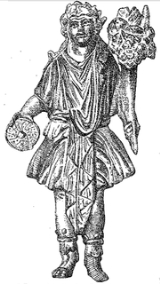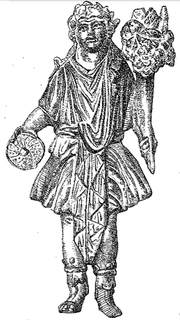
Querolus
Encyclopedia
Querolus or Aulularia (‘The Pot’) is an anonymous Latin comedy from late antiquity, the only Latin drama to survive from this period and the only ancient Latin comedy outside the works of Plautus
and Terence
.

. Modern scholars generally use the title Querolus to avoid confusion with Plautus’ Aulularia.
Date and place of composition are uncertain. Mention of lawlessness ad Ligerem (‘by the Loire’) suggests a Gallic origin and perhaps an early fifth-century date, if it refers to a Bagaudae
uprising. The work is addressed and dedicated to a certain Rutilius (perhaps Rutilius Namatianus
), a vir illustris
and of higher social standing than the author.
or iambic senarius; and there is a tendency to trochaic sequences at the start of the next unit. In the middle however the metrical form of a Plautine verse is only occasionally preserved. The language used also has many reminiscences of early Latin comedy, both occasional archaisms and imitations or borrowings of whole phrases.
Many scenes are extended far beyond the demands of the plot for their own interest. The play opens with an extended discussion between Querolus and the household Lar
, who, in the style of popular philosophy, compels Querolus to admit that his dissatisfaction with life is unjustified and that there is nothing that he can reasonably desire. Querolus’ slave, Pantomalus, has a long monologue complaining of his unreasonable master, which rather reveals his own idleness and dishonesty. Mandrogerus advises Querolus about the various occult powers from which one can seek aid, a scene mocking superstitious beliefs, but also, perhaps, covertly alluding to corrupt civil servants, whose favour must be sought with bribes.
, who devoted an essay to it in his Horae Dramaticae of 1852.
The first printed edition
is that of P. Daniel (Paris 1564). There is no fully satisfactory modern critical edition: Ranstrand (1951) is generally cited, but fails to make use of an important witness, the seventeenth century collation of a lost manuscript from Reims. The ending of the work is missing (although evidently the plot is complete and very little text has been lost). In the manuscripts, it is followed without a break by the (also fragmentary) Lex convivalis
, which some regard as a part of the play.
Plautus
Titus Maccius Plautus , commonly known as "Plautus", was a Roman playwright of the Old Latin period. His comedies are the earliest surviving intact works in Latin literature. He wrote Palliata comoedia, the genre devised by the innovator of Latin literature, Livius Andronicus...
and Terence
Terence
Publius Terentius Afer , better known in English as Terence, was a playwright of the Roman Republic, of North African descent. His comedies were performed for the first time around 170–160 BC. Terentius Lucanus, a Roman senator, brought Terence to Rome as a slave, educated him and later on,...
.

Title and Origins
In his prologue to the spectators the author first says Aululariam hodie sumus acturi (‘We are going to perform the Aulularia today’), then offers a choice of title: Querolus an Aulularia haec dicatur fabula, vestrum hinc iudicium, vestra erit sententia (‘Whether this play is called Querolus or Aulularia will be your judgement, your decision’). The archetype of the surviving manuscripts seem to have had the title Aulularia, along with a false attribution to Plautus, who had also written an AululariaAulularia
Aulularia is a Latin play by the early Roman playwright Titus Maccius Plautus. The title has been translated as The Pot of Gold, and the plot revolves around a literal pot of gold that the miserly protagonist, Euclio, guards zealously...
. Modern scholars generally use the title Querolus to avoid confusion with Plautus’ Aulularia.
Date and place of composition are uncertain. Mention of lawlessness ad Ligerem (‘by the Loire’) suggests a Gallic origin and perhaps an early fifth-century date, if it refers to a Bagaudae
Bagaudae
In the time of the later Roman Empire bagaudae were groups of peasant insurgents who emerged during the "Crisis of the Third Century", and persisted particularly in the less-Romanised areas of Gallia and Hispania, where they were "exposed to the depredations of the late Roman state, and the great...
uprising. The work is addressed and dedicated to a certain Rutilius (perhaps Rutilius Namatianus
Rutilius Claudius Namatianus
Rutilius Claudius Namatianus was a Roman Imperial poet, notable as the author of a Latin poem, De Reditu Suo, in elegiac metre, describing a coastal voyage from Rome to Gaul in 416...
), a vir illustris
Vir illustris
The title vir illustris is used as a formal indication of standing in late antiquity to describe the highest ranks within the senates of Rome and Constantinople...
and of higher social standing than the author.
Metre and Language
Although the text is printed as prose, the author was clearly trying to give the effect of the metres of Plautus. Sentences and phrases regularly end with the line endings of a trochaic septenariusTrochaic septenarius
In ancient Greek and Latin literature, the trochaic septenarius is one of two major forms of poetic metre based on the trochee as its dominant rhythmic unit, the other being trochaic octonarius. It is used in drama and less often in poetry....
or iambic senarius; and there is a tendency to trochaic sequences at the start of the next unit. In the middle however the metrical form of a Plautine verse is only occasionally preserved. The language used also has many reminiscences of early Latin comedy, both occasional archaisms and imitations or borrowings of whole phrases.
Plot
The plot concerns the attempt by a pretended magician, Mandrogerus, to cheat the poor and grumpy Querolus of a treasure hidden in his house. Querolus’ father Euclio, dying abroad, had confided the location of the treasure to Mandrogerus. After Euclio’s death Mandrogerus was to show Querolus the treasure and receive a half share as reward. Instead he tricks Querolus into allowing him to remove his ‘bad fortune’ from his house – the pot with the gold within it. On inspection, the pot seems to be a funerary urn, with only ashes inside it. Mandrogerus throws the pot back into Querolus’ house. It breaks and reveals the gold hidden within. When Mandrogerus learns of the gold, he returns and attempts to claim his share by his agreement with Euclio; but his own account leaves him with a choice of a charge of theft or sacrilege. Finally Querolus takes pity on him and allows him to remain as his dependent.Dramatic technique
It seems unlikely that the author of the work was expecting it to be performed on stage in its original context. More probably it may have been read out as an entertainment at a banquet. But it is clear that the play is written to be performable within the conventions of ancient drama; and many aspects of dramatic technique, such as the preparation and motivation of entrances and exits, are carefully observed.Many scenes are extended far beyond the demands of the plot for their own interest. The play opens with an extended discussion between Querolus and the household Lar
Lares
Lares , archaically Lases, were guardian deities in ancient Roman religion. Their origin is uncertain; they may have been guardians of the hearth, fields, boundaries or fruitfulness, hero-ancestors, or an amalgam of these....
, who, in the style of popular philosophy, compels Querolus to admit that his dissatisfaction with life is unjustified and that there is nothing that he can reasonably desire. Querolus’ slave, Pantomalus, has a long monologue complaining of his unreasonable master, which rather reveals his own idleness and dishonesty. Mandrogerus advises Querolus about the various occult powers from which one can seek aid, a scene mocking superstitious beliefs, but also, perhaps, covertly alluding to corrupt civil servants, whose favour must be sought with bribes.
Models
There are several similarities to Plautus’ Aulularia in the play: the grumpy character of Querolus; a pot of gold; the appearance of the Lar of his house and his role in leading Querolus to discover the gold; a theft. In addition the grumpy house owner in Plautus is called Euclio, the name of Querolus’ father; some see the work as a kind of sequel to Plautus’ play.Reception and Modern Editions
The play had some success in the Middle Ages and provided Vitalis of Blois in the twelfth century with the model for his own Aulularia. Since the renaissance, however, it has been largely neglected. One exception is the satirical novelist Thomas Love PeacockThomas Love Peacock
Thomas Love Peacock was an English satirist and author.Peacock was a close friend of Percy Bysshe Shelley and they influenced each other's work...
, who devoted an essay to it in his Horae Dramaticae of 1852.
The first printed edition
Editio princeps
In classical scholarship, editio princeps is a term of art. It means, roughly, the first printed edition of a work that previously had existed only in manuscripts, which could be circulated only after being copied by hand....
is that of P. Daniel (Paris 1564). There is no fully satisfactory modern critical edition: Ranstrand (1951) is generally cited, but fails to make use of an important witness, the seventeenth century collation of a lost manuscript from Reims. The ending of the work is missing (although evidently the plot is complete and very little text has been lost). In the manuscripts, it is followed without a break by the (also fragmentary) Lex convivalis
Lex convivalis
The Lex convivalis, also known as the Decretum parasiticum, is a humorous Latin text from late antiquity.Only a fragment of this work survives, transmitted at the end of the Querolus. Some editors include it in the text of that work, either at the end, as transmitted, or transposed to an earlier...
, which some regard as a part of the play.

